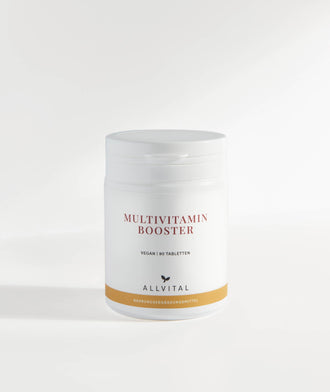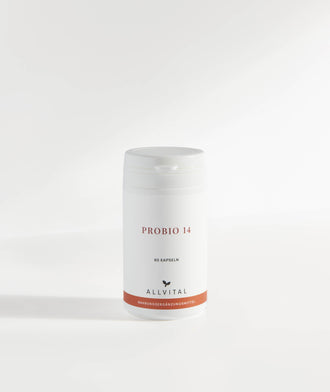
Healthy metabolism: The key to more energy and vitality
A healthy metabolism is the foundation of energy, well-being, and vitality. Learn about the factors that influence it and how you can sustainably strengthen your health with simple measures.
Metabolic disorders are on the rise
In recent decades, the number of metabolic disorders has increased significantly worldwide. Obesity, metabolic syndrome, type 2 diabetes, and non-alcoholic fatty liver disease are affecting more and more people, regardless of age or gender.
The causes often lie in our modern lifestyle: an unhealthy diet high in sugar and processed foods, lack of physical activity, chronic stress, and exposure to harmful substances are among the main factors that negatively impact our metabolic health.
A healthy metabolism is essential for our well-being and performance. But what exactly does metabolism mean, and how can we strengthen it to stay healthy in the long run?
What is metabolism?
The term "metabolism" describes the sum of all biochemical processes in our body. These processes occur in every single cell and are crucial for generating energy, processing nutrients, and eliminating waste products. A well-functioning metabolism ensures that our body is optimally supplied with energy and nutrients while effectively breaking down and excreting harmful substances.
How healthy our metabolism is depends on various factors, including our diet, level of physical activity, sleep hygiene, and genetic predisposition. In the following sections, we will explore specific tips on how to effectively support your metabolism.
Healthy nutrition as a foundation
Proper nutrition is the foundation of a healthy metabolism. It provides the body with the macronutrients and micronutrients it needs to ensure optimal cellular function.
Healthy fats
Fats are essential for our body, particularly for building healthy cell membranes and maintaining hormonal balance.
Omega-3 fatty acids, which are found in fatty fish such as salmon, mackerel, and herring, are especially valuable for cell membrane health. High-quality saturated fats, such as those found in coconut oil or butter from grass-fed cows, also play an important role. Additionally, an adequate supply of phospholipids is crucial for maintaining healthy cell membranes.
When our cell membranes are healthy, cells can absorb and release substances more efficiently. The uptake of micronutrients into the cells and the elimination of toxins increase when the membranes are well-nourished. As a result, all cellular functions improve. Healthy cell membranes are therefore fundamental to a well-functioning metabolism.
Sufficient protein
Proteins are an essential part of our diet, as they provide the body with amino acids needed for building connective tissue fibers, muscles, antibodies, enzymes, storage proteins, and more. Unlike the digestion of carbohydrates and fats, the digestion of proteins has a high thermic effect. This means that the body requires more energy to process them, increasing overall energy expenditure and helping to counteract weight gain.
Moreover, proteins help prevent muscle loss, which can occur especially during calorie deficits and lower our basal metabolic rate (our "metabolism"). They also support the maintenance and growth of muscle mass, which has beneficial effects on metabolic health. You can learn more about this in the section on physical activity.
Healthy sources of protein include lean meat, fish, eggs, and legumes. It is important to choose high-quality foods. Meat and eggs from conventional farming or canned tuna are not healthy food sources but instead contain medication residues and various environmental toxins.
Low sugar and processed carbohydrates
A high consumption of sugar and refined flour, as it is common in Western diets, leads to so-called glucose spikes in the blood—sudden, strong increases and drops in blood sugar levels. Over time, this type of diet promotes blood sugar regulation disorders, resulting in chronically elevated insulin and blood sugar levels. This, in turn, fosters inflammatory processes in the body and increases the risk of developing type 2 diabetes and other metabolic disorders.
For a detailed discussion on this topic, check out our article "Stable blood sugar levels thanks to a healthy diet."
To relieve the metabolism, sugar and refined carbohydrates should be avoided as much as possible. Instead, opt for complex carbohydrates found in whole grain products, potatoes, sweet potatoes, and root vegetables.
Micronutrient-rich diet
Micronutrients such as vitamins, minerals, and trace elements are crucial for a healthy metabolism. These substances act as cofactors (helpers) for enzymes and are required for every biochemical reaction in the body’s metabolic processes.
To increase your intake of micronutrients, it is advisable to choose unprocessed foods from organic sources whenever possible.
Fiber and probiotic foods
The gut has a significant influence on metabolic health. An imbalanced gut microbiome and a compromised intestinal barrier (leaky gut) are risk factors for metabolic disorders and contribute to inflammatory processes throughout the body.
In our article "How a balanced intestinal flora benefits your health," you can learn more about the role of gut health in metabolism.
To support gut health, fiber-rich foods that nourish beneficial gut bacteria, as well as fermented foods that contain beneficial bacteria like lactic acid bacteria, are highly recommended.
Foods high in fiber include vegetables, fruits, whole grain products, legumes, and seeds such as chia or flaxseeds. Fermented foods, such as sauerkraut or kimchi, are excellent sources of probiotics.
Low-toxin diet and lifestyle
Toxins such as pesticides, heavy metals, plasticizers, and microplastics are widespread in our environment and food. These substances accumulate in the body and negatively affect metabolism in various ways. A low-toxin diet and lifestyle are therefore essential for those who want to live healthier and prevent metabolic disorders.
However, it's not just food that matters—toxins can also be found in cosmetics, cleaning products, and household items. Be sure to check ingredient lists and stay informed.
Drink enough water
The human body is composed of approximately 60% water, making it essential for nearly all cellular processes. Water supports detoxification through the kidneys, helps regulate body temperature, and ensures optimal nutrient distribution. Even mild dehydration can slow down metabolism and impair the elimination of toxins.
Exercise for an active metabolism
Physical activity is one of the most effective ways to boost and maintain a healthy metabolism. This is due to several key factors:
- Increased caloric burn – Exercise raises calorie expenditure, reducing the likelihood of a caloric surplus. A simple yet effective strategy is increasing your daily step count, for example, by using a walking treadmill at your desk.
- Protection against insulin resistance – Exercise improves blood sugar regulation by increasing insulin sensitivity in cells. In metabolic disorders like type 2 diabetes, insulin resistance occurs, meaning that cells respond poorly to insulin and absorb glucose from the blood less efficiently. Exercise helps counteract this process.
- Building muscle mass – Strength training is particularly beneficial as it promotes muscle growth. Muscles are more metabolically active than fat tissue and burn more energy even at rest. Regular strength training increases basal metabolic rate, improves body composition, and supports metabolic health through the release of specific signaling molecules.
- Improved circulation – Physical activity enhances blood circulation, which improves the delivery of nutrients to cells and facilitates the removal of toxins.
Sufficient, restorative sleep
Sleep is just as fundamental to metabolic health as nutrition and exercise. Chronic sleep deprivation disrupts metabolism and hormonal balance, promotes inflammation, and increases the risk of insulin resistance. If you aim to lose weight and improve overall health, prioritizing sleep is essential.
Enjoy caffeine in moderation
Caffeine has a stimulating effect on metabolism. It can temporarily increase thermogenesis (heat production) and fat oxidation, thereby boosting energy expenditure. Natural sources such as coffee, green tea, and black tea are popular choices for gently stimulating metabolism.
However, many commercially available coffee brands contain mold toxins that can burden the body. Investing in high-quality, tested brands is worthwhile. Additionally, individuals with adrenal fatigue or high sensitivity to caffeine should limit their intake or avoid it altogether.
Superfoods for metabolism
Certain foods are considered metabolic superfoods because they can stimulate thermogenesis, have anti-inflammatory properties, or support blood sugar regulation. Examples include spicy spices like chili and cayenne pepper, as well as cinnamon, ginger, and turmeric. These spices can be easily incorporated into wholesome meals to enhance their metabolic benefits.
Supplements for a healthy metabolism
A balanced diet and a healthy lifestyle are essential for maintaining a well-functioning metabolism. However, in today’s world, dietary supplements can also be beneficial in ensuring optimal nutrient intake. Below, we introduce a selection of Allvital products designed to support metabolic health:
- Multivitamin Booster – A high-dose micronutrient complex that provides a strong foundation for adequate supply of essential nutrients.
- ProBio14 – Contains 14 different probiotic strains that help maintain a balanced gut microbiome, which is crucial for a healthy metabolism.
- Base Complex – Supports acid-base balance, which is vital for numerous enzymatic processes in metabolism. It helps neutralize excess acids and maintain a healthy pH balance.
- Phyto Basic – A blend of powerful plant extracts that enhance cellular function in multiple ways and protect the body from oxidative stress.
- DHA plus EPA – Provides essential omega-3 fatty acids DHA and EPA from purely plant-based sources, strengthening cell membranes and supporting overall metabolic health.
Conclusion – A healthy metabolism is the foundation of well-being
A well-functioning metabolism is the key to energy, vitality, and overall health. By combining a nutrient-rich diet, regular physical activity, sufficient sleep, and targeted supplementation, metabolic processes can be effectively supported. There are many ways to take proactive steps toward better metabolic health—small changes can lead to significant improvements in well-being.






